|
|
|
Sort Order |
|
|
|
Items / Page
|
|
|
|
|
|
|
| Srl | Item |
| 1 |
ID:
108818
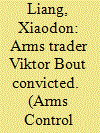

|
|
|
|
|
| Publication |
2011.
|
| Summary/Abstract |
In the high-profile criminal case against a man who has become a symbol of the illicit arms trade, a federal jury in New York City on Nov. 3 found arms dealer Viktor Bout guilty on all four charges brought against him.
|
|
|
|
|
|
|
|
|
|
|
|
|
|
|
|
| 2 |
ID:
120931
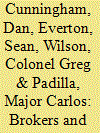

|
|
|
|
|
| Publication |
2013.
|
| Summary/Abstract |
The Fuerzas Armadas Revolucionarias de Colombia (Revolutionary Armed Forces of Colombia-FARC) was originally founded to protect Colombian peasants from harsh landowner policies in exchange for food and supplies. Over time, it has evolved into an internationally connected, narco-trafficking organization that displays little concern for the peasants it once vowed to protect. In recent years, Colombian authorities have become more adept at countering the FARC, forcing it to operate increasingly outside of Colombia. The FARC's transformation from a local insurgency into an internationally connected one is the focus of this article. Using social network analysis it identifies key leaders who are tied to this transformation and discusses implications concerning the FARC's future.
|
|
|
|
|
|
|
|
|
|
|
|
|
|
|
|
| 3 |
ID:
107889
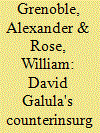

|
|
|
|
|
| Publication |
2011.
|
| Summary/Abstract |
This article applies David Galula's theory of counterinsurgency to help explain the failures and successes in Colombia's counterinsurgency efforts against las Fuerzas Armadas Revolucionarias de Colombia, or the Revolutionary Armed Forces of Colombia (FARC). The case study demonstrates the continuing utility of Galula's ideas which, in their parsimony, highlight most of the important causal factors that account for dissimilar outcomes in the Colombian conflict. Colombia's divergent responses to the FARC throughout the history of the insurgency demonstrate both the detriment of improper strategy and the progress that can be achieved when Galula's laws are utilized.
|
|
|
|
|
|
|
|
|
|
|
|
|
|
|
|
| 4 |
ID:
125942
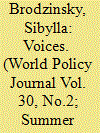

|
|
|
|
|
| Publication |
2013.
|
| Summary/Abstract |
BOGOTÁ-For much of the first half of 2012, Colombia hardly seemed on the path to peace. As they have done for the past half-century, leftist rebels ambushed soldiers, destroyed oil pipelines, set off bombs, and plotted against the government. Government forces, for their part, launched attacks on rebel camps, captured and killed guerrilla leaders, and welcomed deserters.
|
|
|
|
|
|
|
|
|
|
|
|
|
|
|
|
| 5 |
ID:
177845
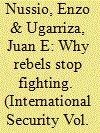

|
|
|
|
|
| Summary/Abstract |
Desertion, or the unauthorized exit from an armed group, has major implications for counterinsurgency, war termination, and recruitment dynamics. While existing research stresses the importance of individual motivations for desertion, organizational decline, in the form of military and financial adversity, can also condition desertion. Organizational decline undermines a group's instruments to channel individual preferences into collective action. These instruments include selective incentives, ideological appeal, and coercion. When the binding power of these instruments diminishes, individual desires start to dominate behavior, making desertion more likely. The Revolutionary Armed Forces of Colombia (FARC) insurgency is used to examine this argument with a multimethod approach. First, a quantitative analysis employs unique data on more than 19,000 reported FARC deserters from 2002 to 2017, provided by the Colombian Ministry of Defense. Guarding against threats to causal inference, statistical analysis indicates that organizational decline drives desertion. Second, a qualitative analysis uses a large body of detailed reports on interviews with deserters conducted by Colombian military personnel. The reports demonstrate that organizational decline weakens selective incentives, group ideology, and a credible coercive regime, and fosters desertion through these mechanisms. These findings provide key insights for policymakers, given that desertion can both contribute to ending conflict and accelerate the recruitment of new combatants.
|
|
|
|
|
|
|
|
|
|
|
|
|
|
|
|
|
|
|
|
|